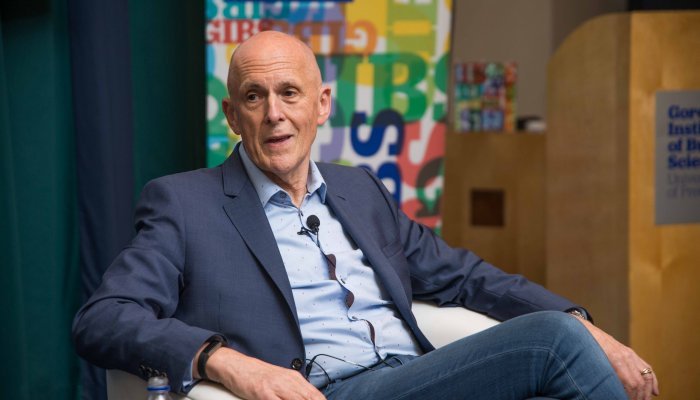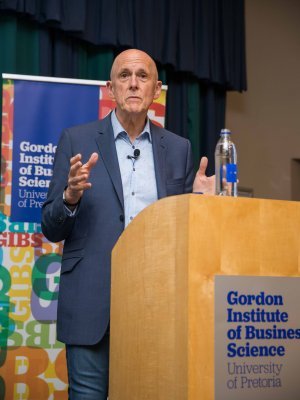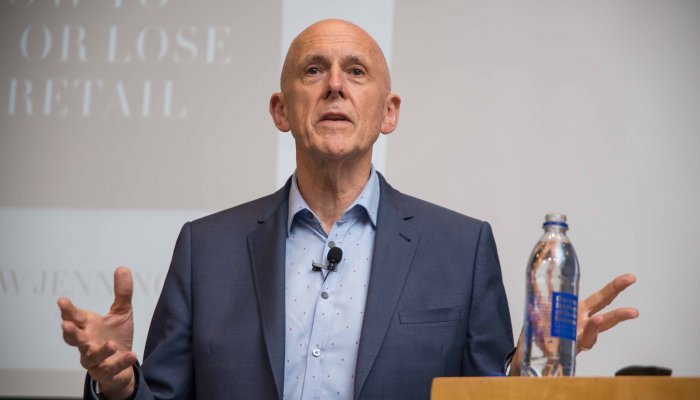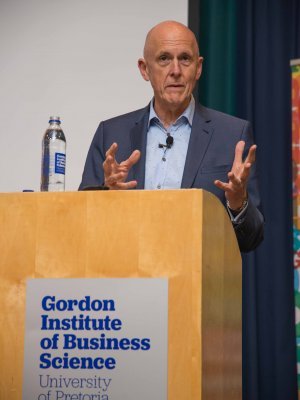This global retail advisor extraordinaire knows all about the bottom line and hitting targets, but he also appreciates that he is dealing with human beings and not just commodities. This is the secret to his success.
Keen to share insights from his new book, Almost is Not Good Enough: How to Win or Lose in Retail, Jennings came to GIBS in October, 2018 to address a high-end audience featuring executives from the likes of Edcon, Spar, Massbuild, Coricraft and Woolworths. “Let’s lock the doors, so no one can escape,” quipped the man who spent three years in South Africa as Group Managing Director: Retail for Woolworths (2006 to 2010). With his depth of experience this was hardly likely: Jennings has more than 45 years of experience and boasts Harrods, House of Fraser, Saks Fifth Avenue and Holt Renfrew on his CV. He started this remarkable journey at the age of 16, and remembers well his first trip to the United States at 18.
“Even after so many years in retail I still regard myself as a student of retail, because I learn something new every week,” he said. So much so that when mentoring youngsters he’ll happily spend an hour with them if they’ll tutor him for just 15 minutes on the latest technology.
While he is fascinated by technology, Jennings believes remaining relevant is still the single most important success factor for any retailer. This means staying in touch with the customer. “I talk a lot about the customer,” said Jennings, “because it’s the customer who makes the decision about whether we, the retailer, will be successful or not… I talk a lot about technology but I also talk about the basics of retail: The right goods, at the right time, at the right price.”
THE SECRET TO RETAIL SUCCESS
· Know your customer and understand their emerging wants, needs, aspirations and desires.
· Constantly innovate. But innovate with excellence.
· Hire talented people, people who are passionate about what they do.
· Keep change at the centre of everything you do.
That’s the great Harry Gordon Selfridge philosophy, he said, and it’s as pertinent today as it was in 1909 when the retail magnate opened his London department store, Selfridges. “You must never forget those factors,” said Jennings. Particularly now, given the pace of change in the industry. “I haven’t seen anything like what is happening to our industry today on a worldwide basis,” said Jennings. “The high streets, the city centres around the globe are under huge pressure, specifically traditional bricks and mortar retailers, and many stores are shutting shop.”
This is being driven by the huge increase in online sales, which are expected to top US$27 trillion by 2020. While in the United Kingdom and Europe online buying sits at about 15.5% of sales, and in the United States it's closer to 17%, this will soon reach 20%-25%, he predicted. South Africa lags at around 1%-2%, but don’t grow complacent, he warned, “because it’s going to go off like a rocket here and … if you snooze you are going to lose”.
Not convinced? Just consider a new survey by real estate firm Douglas Elliman which highlighted a 20% storefront vacancy rate on Manhattan Island, New York City. In 2016 this figure stood at 6%-7%.
How do retailers counter this? They follow Jennings’ four success factors:
1. Know your customer
Today’s customer is a different, more empowered, more connected, more price-savvy being. “They demand transparency and value for money, and they want service every step of the way,” said Jennings.
The only way to attract today’s customer is with excitement. “They want stores of discovery and websites they can navigate around,” he said. “It’s personalisation, it’s next-day delivery, it’s next-hour delivery,” he said, pointing to British supermarket chain, Waitrose, which recently began testing a same-day delivery service. Users install a keyless smart lock which allows delivery companies to access their property, pop perishables in the fridge and deliver goods. All drivers wear video cameras for security.
2. Constantly innovate
You can innovate around events, technology and even community support, just do things differently, said Jennings, before unveiling his best example of the night: the Moby 24-hour convenience store in Shanghai, China.
“There are no cash registers, everything is self-service,” he said. “It’s on wheels because in the next two years in China there will be driverless vehicles and the vehicle can get itself back to the distribution centre to get restocked.” Users download the app and use their phone as a key into the store. Their accounts are automatically debited when they leave.
3. Hire talent
You need to hire the right people and train them well and give them the freedom to make mistakes, stressed Jennings. “Too many companies are run by fear. You can’t have fear. You need a situation where people will take a risk; if you don’t take a risk you’ll never move forward. Remember people make or break a company.”
To get this right you need leaders who inspire and management that can ruthlessly implement.
4. Embrace change
“Customers don’t want to be served by us, they want to be thrilled by us,” said Jennings, remembering his time at Saks Fifth Avenue and one memorable Christmas back in 2004 when the store created a choreographed holiday snowflake spectacle. “At that moment Saks Fifth Avenue became a place of wonder and delight. People poured into the store and we had the most successful Christmas ever,” he recalled. In short: “Retail is theatre.”
**
HOW TO AVOID THE RETAIL GRAVEYARD
“The retail graveyard is full of once great businesses which became irrelevant,” said Jennings, remembering the likes of Greatermans and John Orr’s in South Africa and, more recently, Stuttafords, and Sears in the United States. “But if you are heading towards the retail graveyard you can turn around.”
Using his time at Woolworths as a case study, Jennings offered these tips:
· Spend time on the floor – “In the first couple of months I spent about six weeks just touring stores, talking to customers and staff – because you get a lot of the answers within your own teams and your own customers.”
· Expect resistance – “Everywhere I went I’d say ‘why are we not doing this’, and they’d say ‘we are looking at it’. I then discovered why they were saying that, it was resistance to change.”
· Stand out – “We developed a lot of our own programmes – RE: Denim [a sustainable jeans range] and Twist [a contemporary brand] – to differentiate ourselves from our competition.”
· Take chances – Jennings queried why the Australian Country Road business wasn’t in South Africa. The business wasn’t sure it would work, “but you haven’t tried it”, was his response. “So we did a test and the rest is history, it’s been hugely successful.”
· Interrogate your sourcing strategy – “It’s really about refocusing a business.”
· Don’t discount – “I hate discounting. I hate when I see Black Fridays. You have to be creative. You can’t just discount, discount.”










